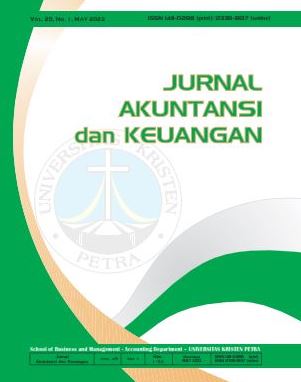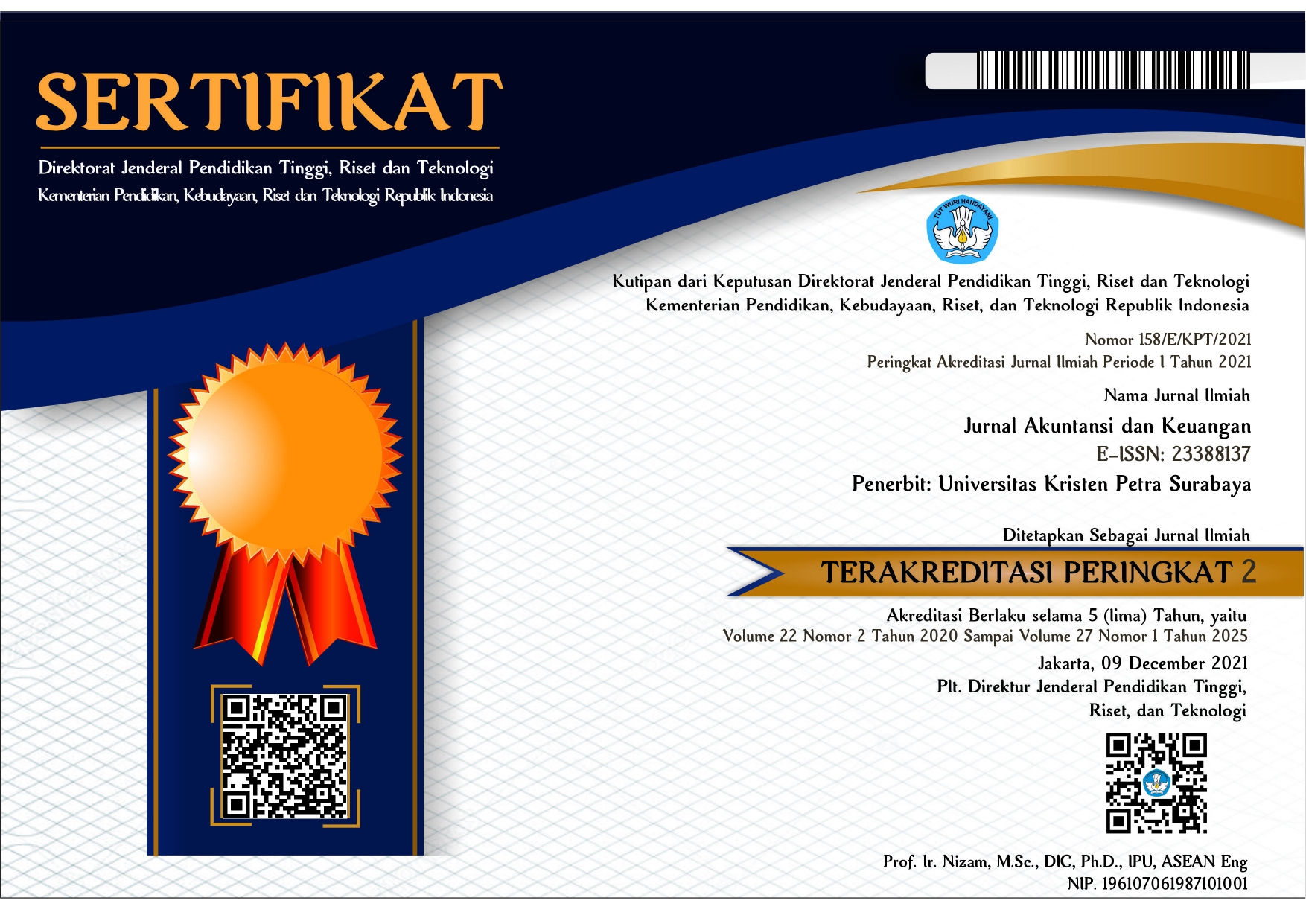Environmental Taxation and Green Economics in Southeast Asia
DOI:
https://doi.org/10.9744/jak.25.1.17-24Keywords:
CO2 Emissions, Sustainable Development, Green economy, TaxationAbstract
This research aims to simulate models of taxes across Southeast Asia by inserting var models such as environment and gasoline fees. This study is for getting the idea that Southeast Asia imposes an environmental fee based on a regression model derived from Southeast Asia's energy consumption and CO2 emissions adjusted by a 10% additional tax (as a dummy variable). This study was motivated by the European Union's policy suggestions on environmental fees, which could be implemented by Southeast Asia. The log-t methods are used in this study, which allows clustering by countries into additional clubs or convergence groupings, and also for utilizing the test for converging within some panel’s states taking into account the variable’s panel data. We believe that environmental fees are an essential public policy tool in Southeast Asia for reducing CO2 emissions as well as the effects on pollutants. Gas tax or carbon pollution tax upon the energy and transportation industries have a substantial influence on raising tax collections in addition to economic expansion within Southeast Asia. Power tax could help to fund initiatives that utilize ecologically good energy while limiting the prohibiting the utilization of natural gas or eco-friendly power. In the transportation industry, the environmental taxes’ function is to reduce emissions of carbon dioxide caused as a result of less environmentally friendly public transport, as well as to support eco-friendly transport.
References
Akhtar, N., Syakir Ishak, M. I., Bhawani, S. A., & Umar, K. (2021). Various natural and anthropogenic factors responsible for water quality degradation: A review. Water, 13(19), 2660-2670.
Bashir, M. F., Ma, B., Komal, B., & Bashir, M. A. (2021). Analysis of environmental taxes publications: a bibliometric and systematic litera-ture review. Environmental Science and Pollution Research, 28(16), 20700-20716.
Beghetto, V., Sole, R., Buranello, C., Al-Abkal, M., & Facchin, M. (2021). Recent advancements in plastic packaging recycling: a mini-review. Materials, 14(17), 4782-4792.
Bilbiie, F., Monacelli, T., & Perotti, R. (2021). Fiscal policy in Europe: controversies over rules, mutual insurance, and centralization. Journal of Economic Perspectives, 35(2), 77-100.
Brizga, J., Jurušs, M., & Šmite-Roķe, B. (2021). Impact of the environmental taxes on reduction of emission from transport in Latvia. Post-Communist Economies, 1-18.
Durrmeyer, I. (2022). Winners and losers: The distributional effects of the French Feebate on the automobile market. The Economic Journal, 132(644), 1414-1448.
Esen, Ö., Yıldırım, D. Ç., & Yıldırım, S. (2021). Pollute less or tax more? Asymmetries in the EU environmental taxes–Ecological balance nexus. Environmental Impact Assessment Review, 91(1), 1-16.
Faroque, S., & South, N. (2022). Lawenforcement challenges, responses and collaborations concerning environmental crimes and harms in Bangladesh. International Journal of Offender Therapy and Comparative Crimino¬logy, 66(4), 389-406.
Fayzullayevich, M. B. (2021). The Problem of Environmental Problems in the Regions of the World. International Journal of Innovative Analyses and Emerging Technology, 1(6), 98-101.
Gӓrtner, G., Stoyneva-Gӓrtner, M., & Uzunov, B. (2021). Algal toxic compounds and their aeroterrestrial, airborne and other extremophilic producers with attention to soil and plant contamination: A review. Toxins, 13(5), 322-332.
Grimaldi, K. C. (2021). The Body under Siege: Corruption and the Female Body in Betool Khedairi’s Ghāyib. Journal of Middle East Women's Studies, 17(2), 240-255.
He, P., Sun, Y., Niu, H., Long, C., & Li, S. (2021). The long and short-term effects of environmental tax on energy efficiency: Perspective of OECD energy tax and vehicle traffic tax. Economic Modelling, 97, 307-325.
Karataş, Z., & Tagay, Ö. (2021). The relationships between resilience of the adults affected by the covid pandemic in Turkey and Covid-19 fear, meaning in life, life satisfaction, into¬lerance of uncertainty and hope. Personality and Individual Differences, 172(1), 1-11.
Karmaker, S. C., Hosan, S., Chapman, A. J., & Saha, B. B. (2021). The role of environmental taxes on technological innovation. Energy, 232(1), 1-12.
Kitamura, Y., Hayashi, M., & Yagi, E. (2018). Traffic problems in Southeast Asia featuring the case of Cambodia's traffic accidents involving motorcycles. IATSS Research, 42(4), 163-170.
Krampe, F., Hegazi, F., & VanDeveer, S. D. (2021). Sustaining peace through better resource governance: Three potential mechanisms for environmental peacebuilding. World Development, 144(1), 1-10.
Liu, T., Song, Y., Xing, X., Zhu, Y., & Qu, Z. (2021). Bridging production factors allocation and environmental performance of China’s heavypolluting energy firms: The moderation effect of financing and internationalization. Energy, 222(1), 1-11.
López Pérez, S. D. J., & Vence, X. (2021). When harmful tax expenditure prevails over environmental tax: An assessment on the 2014 Mexican fiscal reform. Sustainability, 13(20), 11269-11279.
Macioszek, E. (2021). The Role of Incentive Programs in Promoting the Purchase of Electric Cars—Review of Good Practices and Promoting Methods from the World. Research Methods in Modern Urban Transportation Systems and Networks, 41-58.
Mahmood, N., Zhao, Y., Lou, Q., & Geng, J. (2022). Role of environmental regulations and eco-innovation in energy structure transition for green growth: Evidence from OECD. Technological Forecasting and Social Change, 183(1), 1-12.
Marciano, A. (2021). Retrospectives: James Buchanan: Clubs and Alternative Welfare Economics. Journal of Economic Perspectives, 35(3), 243-56.
Mirović, V., Kalaš, B., & Milenković, N. (2021). Panel Cointegration Analysis of Total Environmental Taxes and Economic Growth in EU Countries. Economic Analysis, 54(1), 92-103.
Mise, R., Kitano, N., & Morimoto, A. (2022). Combination Effects of Next-Generation Tran-sportation and Carbon Taxes on Future Envi¬ron-mental Burden for Aiming to Zero Emission. Urban and Regional Planning Review, 9, 80-99.
Moon, H., Yoo, S. H., & Huh, S. Y. (2021). Monetary valuation of air quality improvement with the stated preference technique: A multi-pollutant perspective. Science of the Total Environment, 793(1), 1-14.
Mubarika, N. R., Handayani, R. S. (2022). Value Relevance of Accounting Information from PSAK 72. Jurnal Akuntansi dan Keuangan, 24(1), 1-9.
Mutascu, M. I., Albulescu, C. T., Apergis, N., & Magazzino, C. (2022). Do gasoline and diesel prices comove? Evidence from the timefrequency domain. Environmental Science and Pollution Research, 1-20.
Nguyen, A. H., Hoang, T. G., Nguyen, D. T., Nguyen, L. Q. T., & Doan, D. T. (2022). The development of green bond in developing countries: Insights from Southeast Asia market participants. The European Journal of Development Research, 1-23.
Nurhidayati, N., & Fuadillah, H. (2018). The Influence of Income Shifting Incentives towards The Tax Haven Country Utilization: Case Study on the Companies listed in Indonesian Stock Exchange. Jurnal Akuntansi dan Keuangan, 20(1), 27-38.
Nyarko, S. C., & Petcovic, H. L. (2021). Ghanaian preservice science teachers’ knowledge of ozone depletion and climate change, and sources of their knowledge. International Journal of Science Education, 43(10), 1554-1575.
Østli, V., Fridstrøm, L., Kristensen, N. B., & Lindberg, G. (2021). Comparing the Scandinavian automobile taxation systems and their CO2 mitigation effects. International Journal of Sustainable Transportation, 1-18.
Paul, A., Pervin, M., Roy, S. K., Maculan, N., & Weber, G. W. (2022). A green inventory model with the effect of carbon taxation. Annals of Operations Research, 309(1), 233-248.
Phillips, P.C.B., Sul, D. (2009). Economic transition and growth. Journal of Applied Econo¬me¬trics. 24(7), 1153-1185. https://doi.org/10.1002/jae.1080
Prabowo,B.H., Drean,B.(2022).Green Finance and Green Economic Trade Off Economic and Environtment in Indonesia. ASIAN Economic and Business Development, 4(1),7-13.
Prestianawati, S. A., Syafitri, W., & Bawono, S. (2019). Public Policy Implication of Sand Mining Sector Dynamics in Indonesia. Review of Behavioral Aspect in Organizations and Society, 1(1), 87-94. https://doi.org/10.32770/rbaos.vol187-94
Priyanto, E., Schneider, C. (2021). Green Sustainable Human Resource Management in Malaysia.1(1), 21-24. https://doi.org/10.54204/splashmagzvol1no1pp21to24
Rafique, M. Z., Fareed, Z., Ferraz, D., Ikram, M., & Huang, S. (2022). Exploring the heterogenous impacts of environmental taxes on environmental footprints: an empirical assessment from developed economies. Energy, 238(1), 1-12.
Ravikanth, G. (2021). Indian Philosophy and Environmental Ethics. GNOSI: An Interdisci-plinary. Journal of Human Theory and Praxis, 4(1), 47-63.
Ren, S., Hao, Y., & Wu, H. (2022). How does green investment affect environmental pollution? Evidence from China. Environmental and Resource Economics, 81(1), 25-51.
Romero-Carrión, V. L., Campos-Pérez, R., Solís-Fonseca, J. P., Altamirano-Romero, J. C., & Flores, E. (2022). Energy efficiency labelling in carbon dioxide mitigation. Australian Journal of Electrical and Electronics Engineering, 1-8.
Sabokro, M., Masud, M. M., & Kayedian, A. (2021). The effect of green human resources management on corporate social responsibility, green psychological climate and employ¬es’ green behavior. Journal of Cleaner Production, 313(1), 1-12.
Sahib, A. S., & Farag, J. H. (2021). Relation¬ship between Environmental Tax and Production Cost. Cuadernos de Economía, 44(126), 57-66.
Sarigül, S. S., & Topcu, B. A. (2021). The impact of environmental taxes on carbon dioxide emissions in Turkey. International Journal of Business and Economic Studies, 3(1), 43-54.
Sasongko, B., Bawono, S., & Prabowo, B. H. (2021). The Economic Performance of China in Trade War: The Case Study of Three Global Economic Crises in 1997–2020. In Environmental, Social, and Governance Perspectives on Economic Development in Asia. Emerald Publishing Limited.
Shah, R. V., & Guha, S. (2021). Private sector participation in solid waste management and regulatory strategy. Economic & Political Weekly, 56(32), 95-101.
Siala, K., Chowdhury, A. K., Dang, T. D., & Galelli, S. (2021). Solar energy and regional coordination as a feasible alternative to large hydropower in Southeast Asia. Nature Communications, 12(1), 1-10.
Sousa Filho, H. R., de Jesus, R. M., Bezerra, M. A., Santana, G. M., & de Santana, R. O. (2021). History, dissemination, and field control strategies of cocoa witches’ broom. Plant Pathology, 70(9), 1971-1978.
Steinsland, C., Fridstrøm, L., Madslien, A., & Minken, H. (2018). The climate, economic and equity effects of fuel tax, road toll and commuter tax credit. Transport Policy, 72, 225-241.
Sun, Y., Guan, W., Razzaq, A., Shahzad, M., & An, N. B. (2022). Transition towards ecological sustainability through fiscal decentralization, renewable energy and green investment in OECD countries. Renewable Energy, 190, 385-395.
Vence, X., & López Pérez, S. D. J. (2021). Taxa¬tion for a circular economy: New instruments, reforms, and architectural changes in the fiscal system. Sustainability, 13(8), 4581-4591.
Wang, P., Lin, C. K., Wang, Y., Liu, D., Song, D., & Wu, T. (2021). Location-specific co-benefits of carbon emissions reduction from coalfired power plants in China. Nature communications, 12(1), 1-11.
Wang, X., Khurshid, A., Qayyum, S., & Calin, A. C. (2022). The role of green innovations, environmental policies and carbon taxes in achieving the sustainable development goals of carbon neutrality. Environmental Science and Pollution Research, 29(6), 8393-8407.
Xiong, J., & Xu, D. (2021). Relationship between energy consumption, economic growth and environmental pollution in China. Environmental Research, 194(1), 1-11.
Yaroshevych, N. B., Gutyj, B. V., Hrymak, O. Y., Kushnir, L. P., Kalaitan, T. V., Kondrat, I. Y., & Shevchuk, O. O. (2021). The state of environmental taxation in Ukraine and the main directions of reform. Ukrainian Journal of Ecology, 11(1), 350-359.
Downloads
Published
How to Cite
Issue
Section
License
Authors who publish with this journal agree to the following terms:
- Authors retain the copyright and publishing right, and grant the journal right of first publication with the work simultaneously licensed under a Creative Commons Attribution License that allows others to share the work with an acknowledgement of the work's authorship and initial publication in this journal.
- Authors are able to enter into separate, additional contractual arrangements for the non-exclusive distribution of the journal's published version of the work (e.g., post it to an institutional repository or publish it in a book), with an acknowledgement of its initial publication in this journal.
- Authors are permitted and encouraged to post their work online (e.g., in institutional repositories or on their website) followingthe publication of the article, as it can lead to productive exchanges, as well as earlier and greater citation of published work (See The Effect of Open Access).<a href="http://creativecommons.org/lice















